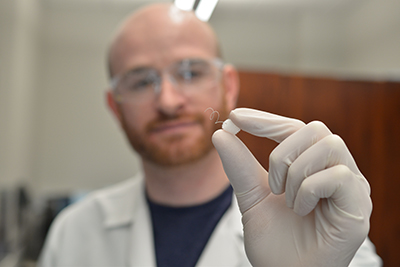 A device intended to more effectively treat abdominal aortic aneurysms as well as uncontrolled internal bleeding after serious injuries is a step closer to reality thanks to a National Institutes of Health (NIH) grant received by Todd Landsman, graduate student in the Department of Biomedical Engineering at Texas A&M University.
A device intended to more effectively treat abdominal aortic aneurysms as well as uncontrolled internal bleeding after serious injuries is a step closer to reality thanks to a National Institutes of Health (NIH) grant received by Todd Landsman, graduate student in the Department of Biomedical Engineering at Texas A&M University.
The Small Business Innovative Research (SBIR) grant, awarded by the National Institute of Biomedical Imaging and Bioengineering of NIH, is intended to help commercialize the medical technology being developed by Landsman in conjunction with Shape Memory Therapeutics, Inc. a local medical device company at which Landsman is engineering manager.
Joining Landsman in the development of the device are co-investigator and professor Duncan Maitland and clinical consultants Ruth Bush, vice dean of the Texas A&M Health Science Center College of Medicine, and Alan Glowczwski, director of imaging at the Texas A&M Institute for Preclinical Studies.
With the grant, Landsman and his team will continue to conduct research on the device, further testing its feasibility before advancing to clinical trials in preparation for FDA approval, which is expected early 2017.
The embolization device, Landsman explains, can be used to treat uncontrolled internal bleeding after blunt trauma to the liver, spleen or kidneys – the types of injuries resulting from car accidents or explosions; bulging veins that don't function properly, which cause significant abdominal pain in women and infertility in men; and potentially fatal abdominal aortic aneurysms that are at risk of rupture.
Unlike current embolization technology that requires multiple devices for each application, the technology being developed by Landsman and his team requires only a single device and results in reduced radiation exposure; reduced risk of device migration; and improved healing that prevents the vessel from rebleeding after treatment, which happens in up to 30 percent of cases, he notes.
The NIH SBIR program is one of the largest sources of early-stage capital for innovative small companies in the United States. The program funds early-stage small businesses that are seeking to commercialize innovative biomedical technologies. This competitive program helps small businesses participate in federal research and development, develop life-saving technologies, and create jobs.
Shape Memory Therapeutics, Inc. is a medical device company founded by Maitland to commercialize innovative medical devices based on shape memory polymer (SMP) materials that were developed at Texas A&M and Lawrence Livermore National Laboratory. The company leverages the unique properties of SMPs – high expansion capability and a low expansion force – for minimally invasive endovascular applications such as the treatment of aneurysms.
This research is supported by the National Institute Of Biomedical Imaging And Bioengineering of the National Institutes of Health under Award Number R43EB022016.
About the Department of Biomedical Engineering
Committed to solving the world’s greatest health problems through the exploration of new ideas, integrated research and innovation, the Department of Biomedical Engineering at Texas A&M is producing the next generation of biomedical engineers, developing new technologies and new jobs, and achieving revolutionary advancements for the future of health care. The department has unique strengths in regenerative engineering, medical augmentation, molecular diagnostics/theranostics, tele-health, and precision medicine, and its faculty members are internationally recognized with collaborative relationships that span engineering, physical and natural sciences, medicine and veterinary sciences.